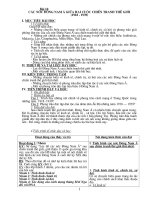Nuoc My giua 2 cuoc CTTG (tu lieu nuoc ngoai)
Bạn đang xem bản rút gọn của tài liệu. Xem và tải ngay bản đầy đủ của tài liệu tại đây (3.42 MB, 40 trang )
American Foreign
Policy:
19201941
Ms. Susan M. Pojer
Horace Greeley HS Chappaqua, NY
Foreign Policy Tensions
Foreign Policy Tensions
Interventionism
Interventionism
Disarmament
Disarmament
•
Collective security
Collective security
•
“
“
Wilsonianism”
Wilsonianism”
•
Business interests
Business interests
•
Isolationism
Isolationism
•
Nativists
Nativists
•
Anti-War movement
Anti-War movement
•
Conservative
Conservative
Republicans
Republicans
American Isolationism
American Isolationism
5
Isolationists like
Isolationists like
Senator Lodge, refused
Senator Lodge, refused
to allow the US to sign
to allow the US to sign
the Versailles Treaty.
the Versailles Treaty.
5
Security treaty with
Security treaty with
France also rejected by
France also rejected by
the Senate.
the Senate.
5
July, 1921
July, 1921
Congress
Congress
passed a resolution
passed a resolution
declaring WW I
declaring WW I
officially over!
officially over!
Sen. Henry Cabot
Sen. Henry Cabot
Lodge, Sr. [R-MA]
Lodge, Sr. [R-MA]
Washington Disarmament
Washington Disarmament
Conference
Conference
(19211922)
(19211922)
5
Long-standing Anglo-Japanese alliance (1902) obligated
Long-standing Anglo-Japanese alliance (1902) obligated
Britain to aid Japan in the event of a Japanese war with the
Britain to aid Japan in the event of a Japanese war with the
United States.
United States.
5
Goals
Goals
naval disarmament and the political situation in the
naval disarmament and the political situation in the
Far East.
Far East.
FivePower Treaty
FivePower Treaty
(1922)
(1922)
5
A battleship ratio was achieved through this ratio:
A battleship ratio was achieved through this ratio:
US Britain Japan France Italy
US Britain Japan France Italy
5 5 3 1.67 1.67
5 5 3 1.67 1.67
5
Japan got a guarantee that the US and Britain would
Japan got a guarantee that the US and Britain would
stop fortifying their Far East territories [including the
stop fortifying their Far East territories [including the
Philippines].
Philippines].
5
Loophole
Loophole
no restrictions on small warships
no restrictions on small warships
European Debts to the US
European Debts to the US
HyperInflation in Germany:
HyperInflation in Germany:
1923
1923
Dawes Plan
Dawes Plan
(1924)
(1924)
Young Plan
Young Plan
(1930)
(1930)
5
For three generations, you’ll have to slave away!
For three generations, you’ll have to slave away!
5
$26,350,000,000 to be paid over a period of 58½
$26,350,000,000 to be paid over a period of 58½
years.
years.
5
By 1931, Hoover declared a debt moratorium.
By 1931, Hoover declared a debt moratorium.
Locarno Pact
Locarno Pact
(1925)
(1925)
5
Guaranteed the common boundaries of Belgium, France, and
Guaranteed the common boundaries of Belgium, France, and
Germany as specified in the Treaty of Versailles of 1919.
Germany as specified in the Treaty of Versailles of 1919.
5
Germany signed treaties with Poland and Czechoslovakia,
Germany signed treaties with Poland and Czechoslovakia,
agreeing to change the eastern borders of Germany by
agreeing to change the eastern borders of Germany by
arbitration only
arbitration only.
Clark Memorandum
Clark Memorandum
(1928)
(1928)
5
Clark pledged that the
Clark pledged that the
US would not intervene in
US would not intervene in
Latin American affairs in
Latin American affairs in
order to protect US
order to protect US
property rights.
property rights.
5
This was a complete
This was a complete
rebuke of the Roosevelt
rebuke of the Roosevelt
Corollary to the Monroe
Corollary to the Monroe
Doctrine!
Doctrine!
Secretary of State
Secretary of State
J. Reuben Clark
J. Reuben Clark
KelloggBriand Pact
KelloggBriand Pact
(1928)
(1928)
5
15 nations dedicated to outlawing aggression and war as
15 nations dedicated to outlawing aggression and war as
tools of foreign policy.
tools of foreign policy.
5
62 nations signed.
62 nations signed.
5
Problems
Problems
no means of actual enforcement and gave
no means of actual enforcement and gave
Americans a false sense of security.
Americans a false sense of security.
Japanese Attack Manchuria
Japanese Attack Manchuria
(1931)
(1931)
5
League of Nations condemned the
League of Nations condemned the
action.
action.
5
Japan leaves the League.
Japan leaves the League.
5
Hoover wanted no part in an American military action in
Hoover wanted no part in an American military action in
the Far East.
the Far East.
HooverStimpson Doctrine
HooverStimpson Doctrine
(1932)
(1932)
5
US would not recognize any territorial
US would not recognize any territorial
acquisitions that were achieved by force.
acquisitions that were achieved by force.
5
Japan was infuriated because the US had
Japan was infuriated because the US had
conquered new
conquered new
territories a few
territories a few
decades earlier.
decades earlier.
5
Japan bombed
Japan bombed
Shanghai in
Shanghai in
1932
1932
massive
massive
casualties.
casualties.
FDR’s “Good Neighbor” Policy
FDR’s “Good Neighbor” Policy
5
Important to have all
Important to have all
nations in the Western
nations in the Western
Hemisphere united in
Hemisphere united in
lieu of foreign
lieu of foreign
aggressions.
aggressions.
5
FDR
FDR
The good
The good
neighbor respects
neighbor respects
himself and the rights
himself and the rights
of others
of others
.
.
5
Policy of non-
Policy of non-
intervention and
intervention and
cooperation.
cooperation.
FDR Recognizes the Soviet
FDR Recognizes the Soviet
Union
Union
(late 1933)
(late 1933)
5
FDR felt that
FDR felt that
recognizing Moscow
recognizing Moscow
might bolster the
might bolster the
US against Japan.
US against Japan.
5
Maybe trade with
Maybe trade with
the USSR would
the USSR would
help the US
help the US
economy during the
economy during the
Depression.
Depression.









